Archive for April, 2016
30 Apr 2016

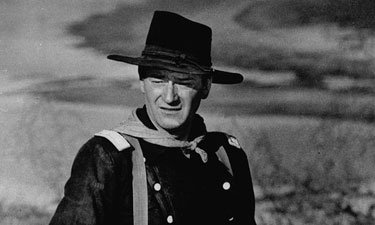
Whiny-minority democrats in the California State Assembly rejected a holiday honoring John Wayne, because the actor (who died in 1979) had been conservative and had made a couple of un-pc comments (one of them probably a joke) decades and decades ago.
Fox 5:
What a California lawmaker intended as a benign resolution honoring a late, world-renowned movie icon exploded into an emotional debate over decades-old racist comments.
The state Assembly defeated the official ode to John Wayne Thursday after several legislators described statements he made about racial minorities and his support for the anti-communist House Un-American Activities Committee and John Birch Society.
Republican State Assemblyman Matthew Harper of Huntington Beach sought to declare May 26, 2016, as John Wayne Day to mark the day the actor was born.
“He had disturbing views towards race,” objected Assemblyman Luis Alejo, D-Watsonville, leading off a 20-minute debate.
Alejo cited a 1971 interview with Playboy in which Wayne talked disparagingly about blacks.
“I believe in white supremacy until the blacks are educated to a point of responsibility. I don’t believe in giving authority and positions of leadership and judgment to irresponsible people,” he told the magazine.
Assemblyman Mike Gipson, D-Carson, who is black, said he found Wayne’s comments personally offensive.
Assemblywoman Lorena Gonzalez, D-San Diego, cited his comments defending white Europeans’ encroachment on American Indians who Wayne once said “were selfishly trying to keep it for themselves.”
All of which proves that, back then, John Wayne was perfect right about their kind. You read this kind of thing and think: The sooner North Korea perfects delivery systems able to reach California the better. Cut the continent off at the Sierras and float those communists out to sea.
30 Apr 2016
Animal lovers got a shock yesterday when a webcam broadcasting pictures of a bald eagle nest in Pittsburgh showed the adult eagles feeding somebody’s domestic cat to their chicks.
Washington Post story
Cats? Bald eagles are powerful enough to kill sheep or even small deer.
30 Apr 2016

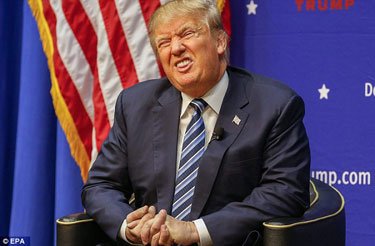
Politico thought it would be good if everyone actually understood the reality of Donald Trump, so they convened some experts on Trump’s career and biography, five Trumpologists who covered him professionally: Wayne Barrett, a longtime Village Voice reporter; Gwenda Blair, a bestselling author; Pulitzer Prize-winning journalist Michael D’Antonio; Harry Hurt III, an author and videographer; and Timothy L. O’Brien, a writer and editor at Bloomberg.
Three Excerpts:
1:
Michael Kruse: I’d like to start talking about Donald by talking about Fred Sr. and going back to the very beginning, to Jamaica Estates [the Queens neighborhood where Donald grew up]. What do people need to know? What should we know about Donald because of his father, because of that relationship?
Harry Hurt III: I ran into Fred at Coney Island, with his secretary-mistress, one day, and he usually went to a place called Gargiulo’s down in that area. But that was closed that day, and so I was with my researcher and we tailed them over to the original Nathan’s hot dog stand. Donald was flying somewhere at the time, and we overheard Fred wipe some mustard off his lip, like this here, and he said, “I hope his plane crashes.†And I looked at my researcher, and I said, “Did you hear what I just heard?†He said, “Yes, I did.†I said, “Well, that’s my man. That’s Fred. The apple don’t fall far from the tree.â€
2:
Barrett: Well, you know, with all this Tea Party anger that he’s appealing to now, he was the original bailout. I mean, the banks could have put him under any day. They took tremendous losses in those negotiations and deals. So they saved him. He was too big to fail.
Hurt: He was the original “too big to fail.â€
Barrett: He’s the consummate example of what his voters rail against.
O’Brien: I remember Trump’s finance chief Steve Bollenbach, who worked through the debt for him, said he had this conversation one day where they were going to take the yacht. And they didn’t want to take the yacht. And the light suddenly went on in their heads: The banks actually don’t want to control all these assets. They want him to operate out of it, and they both thought, “Wow.†That was the moment when they realized they had leverage.
You know, everything he does now, he doesn’t need loans to do any of it. The golf courses are owned by the members. They pay fees that finance it. He gets a salary from NBC from The Apprentice, and he gets licensing fees for everything else. I mean, there’s some projects, like the Chicago hotel—he got bank debt for that. Deutsche Bank loaned into that one.
Barrett: But he’s gone from the 18th floor to the 18th hole.
[Laughter.]
Blair: It was branding. It was the early branding that kicked in for him. He spent the ’80s getting that brand going. So he buys the shuttle, he buys the yacht, he buys the Plaza Hotel, everything—
O’Brien: The Generals.
Blair: The New Jersey Generals, which gets him onto the sports pages, which gets him up to a national level. So the branding he had in place, so by the time the first bankruptcy comes up, the brand is the thing they don’t want to let go of. They don’t want to foreclose and not have the name, which is so counterintuitive that the mind boggles. Like, wait a minute. This guy is in corporate bankruptcy, but his name—but that’s how it was. He could get the over-the-barrel piece for the banks, and he’s been doing it ever since. It’s the over-the-barrel piece which he did with the Republican Party now. How do you get them so they can’t get rid of you, they can’t let you go? And he’s really good at that.
Barrett: Well, the thing was that the banks wouldn’t complain, either. When they cut the deal with him, if they didn’t go on to a prosecutor—I mean, all of the financials that he gave the banks were totally false.
Hurt: And they’re liable for that, for not doing their due diligence.
Barrett: Yes. They were so embarrassed that they never went to a prosecutor. Clearly, there could have been a case made.
3:
O’Brien: The other thing, too, that I think the media has to hold his feet to the fire on is he’s gotten away with this notion that he’s a superior deal-maker, and a very successful businessman. I thought about it after he went after the Iran deal. He said, “Obama negotiated this horrible deal with Iran. It’s a bad deal, and when I get to Washington, there won’t be bad deals anymore. I’m a great deal-maker.†And then the reality, the objective reality, is that he’s been a horrible deal-maker. His career is littered with bad deals. And yet, he’s essentially now a human shingle. He’s not someone who’s a particularly adept deal-maker, if you look at his whole career.
Kruse: A human shingle, because there were the bad deals that brought him down in the early to mid-’90s, right?
O’Brien: What he was left with was licensing his name. So he licenses his name on mattresses and underwear and vodka and buildings, among other products.
Kruse: He made this transition from being an actual businessman, a person who does deals, some of which were good, to a grand promoter of his own name.
O’Brien: And the reality TV version of a successful businessman.
Barrett: This is the ultimate promotion of his own name. This is the ultimate brand.
Kruse: But the fact is that there is a middle ground. There is, basically, 1990-ish to 1995 where he is a failure.
O’Brien: He’s in desperate straits. He almost had to go personally bankrupt.
Kruse: The success is that he didn’t die a business death. The success was survival.
O’Brien: And he was a survivor, to his credit. He survived.
Kruse: Why, though, wasn’t that failure?
O’Brien: Because of The Apprentice. I think singularly because of The Apprentice. But he was a joke in between 1993 and 2003.
Blair: You know that family legacy, that family culture of “never give up.†He never said he was a failure. Everybody else said, “This guy is going down. He’s filed for bankruptcy. This is terrible,†but he didn’t say that. He continued to say he was the best of the best, the biggest of the biggest, and he went on. I think that’s a huge piece of that.
Barrett: I tell the tale towards the end of the book about after the settlement with Ivana, he goes to meet with John Scanlon, who was a New York publicist of some skill, and tries to hire Ivana’s publicist to now represent him, and tells John, who is now dead, “I’m going to make a giant comeback, and I want to be on the cover of Time again, and I want you to handle it.â€
So he’s already thinking that way, in that very down moment of his life, but he knew he had bilked the banks. The banks put him back up on the pedestal. They didn’t have to, but it took a while to climb up that ladder.
D’Antonio: What about the fact that Fred died and that money became available?
O’Brien: Which totally insulated him from a lot of problems, that inheritance that he got from Fred. At one point, he needed his siblings to extend him a loan. I think it was the hard reality of family money.
D’Antonio: The first thing I think that you credit him with is this creation of himself, which is very American, this idea that I’m going to imagine what I’m going to be, I’m going to tell the world that I’m it before I am it, and then the world is going to help me become it. And he did it.
O’Brien: Think about the genesis of The Apprentice. The show got launched because Mark Burnett [the producer of The Apprentice], as an immigrant to the United States, is selling blue jeans in Venice, California, barely making it. He doesn’t have any faith in himself and reads this book called The Art of the Deal, and he thinks, “Wow, this is the bible of how you make it in America.†And then whatever it is, 25, 30 years later, he does Survivor. That’s a huge hit. He becomes a force in the TV industry, and he thinks, “I’m going to go back to the godfather of my success, Donald Trump, and I’m going to create a TV show that embodies the inspiration I felt from The Art of the Deal.†And that’s how The Apprentice gets launched, because The Art of the Deal, as Wayne knows, didn’t comport with reality, and The Apprentice is just a TV version of The Art of the Deal. It’s a total distortion of reality.
Glasser: So it’s a TV show about a book about a guy who was an invented character.
O’Brien: Yes.
Glasser: That’s now led to a campaign based on the TV show based on the book.
O’Brien: About a man who’s saying he’s a politician, who could probably never really deliver on everything he’s saying.
D’Antonio: So it’s all about this autobiography, which isn’t auto, and it isn’t a biography—which is, you know, only in America.
Read the whole thing.
29 Apr 2016

Hat tip to Vanderleun.
29 Apr 2016

The Mirror: Donald Trump denies rape of teenage girl at ‘sex party’ with convicted paedophile Jeffrey Epstein
The real question is: How many more of these little stinkbombs has Hillary got stashed away waiting for the Fall? and Can any of the bimbos’ stories be proven true? Chances are…
29 Apr 2016

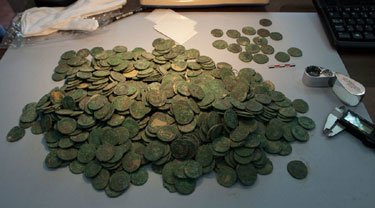
RT News:
Construction workers repairing water pipes in Seville, southern Spain, have discovered 600kg of ancient Roman coins, covered with dirt and dust. The find is said to be worth at least “several million euros.â€
Tens of thousands of bronze coins, dating back to the third and fourth centuries, were found inside 19 Roman amphoras in the town of Tomares near Seville, El Pais reported.
“This find is extremely important,†Ana Navarro, head of Seville’s Archeology Museum now looking after the find, told El Pais. “It is a unique collection, and there are very few similar cases,†she added.
The discovery of the jars full of coins happened on Wednesday during construction work about 10 kilometers from Seville.
“Those are not amphoras meant to store wine or oil. They are smaller and were used to transport other goods. Surprisingly [they were] used to save money,” Navarro told the newspaper.
AFP quoted Navarro as saying the coins, stamped with inscriptions of Emperors Maximian and Constantine on the reverse side, are worth “several million euros.â€
“I could not give you an monetary value, because the value they really have is historical and you can’t calculate that.â€
Although most coins are bronze, archaeologists say some appear to be silver-plated. “Most show little evidence of wear, which means they were not in circulation,” Navarro explained.
“It is surprising to have found 19 jars filled with coins. Out hypothesis is that the money was used to pay imperial taxes or paying the army,†Navarro told the newspaper, adding that the amphoras were probably hidden “because of social conflicts, violence [and other] threats.â€
Local authorities have suspended work on the water pipes to carry out archaeological excavations at the site.
29 Apr 2016

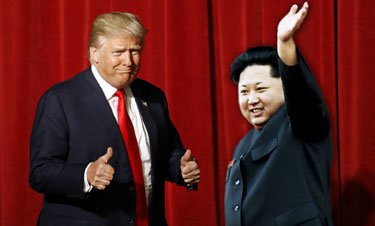
Robert Zubrin, at Ricochet, talks Foreign Policy (and Ethics) with the great man.
[D]id you hear the latest news? North Korea now says it has nuclear missiles that could hit the United States. What should we do about it?â€
Trump shrugged. “Just let me handle things.â€
This took me aback. “What? How?â€
The billionaire looked me in the eyes and pointed his finger at my nose. “Listen, kid. Success in life is about knowing people. If you want to be the top guy, you got to know the top people. I know the top guy over there. So everybody should just stop acting like a bunch of [expletive, plural] and relax. I got it covered.â€
Now I was really amazed. “You know the top guy in North Korea?†I stammered. “You know Kim Jong-un?â€
“Yeah, sure, I know Kim.†Trump smiled. “I built him a grand casino and strip joint in Pyongyang. He’s a swell guy, top drawer. Whenever we had a problem, he’d take care of it, so quick, you wouldn’t believe it. A bunch of squatters wouldn’t get out of their lousy little shacks so we could build a parking lot; bang, squash, pave, and in 24 hours flat, you’ve got the most beautiful parking lot you ever saw. When I’m President, that’s how we are going to do things here. No more of this go-to-court crap.â€
I hadn’t realized that there was a Trump grand casino and strip club in Pyongyang, and wanted to know more. “What’s the casino like?â€
“It’s wonderful, it’s magnificent, it’s yuge!†said Trump, spreading his arms expansively.“The carpets are all panda skins, the furniture is all made of ivory, the walls are solid gold, the dining room silverware is platinum, and the glasses are made from diamonds, freshly dug from the most exclusive mines in Africa. The menu is unmatched: Crimean caviar, Bolivian cocaine, Siberian tiger hearts, Pacific bottlenose dolphin liver pate, elephant balls. And the broads they got, wow. Top of the line, kid, top of the line. Not just a bunch of cute little oriental chicks like you might find in a lot of places out there, but top drawer Russian blonde bombshells chosen for us by Putin himself. And, let me tell you, my friend, Vlad really knows how to choose them.â€
I nodded. “Yes, you mentioned in one of the debates that you and Putin are good friends.â€
“Sure,†said Trump, smiling wickedly. “If you are looking for a good time in Moscow, he’s definitely the man to see.â€
“Yet,†I said, “Putin is also the guy whose bombs are stampeding our way all those Muslim refugees that you are making such a fuss about. Doesn’t that bother you?â€
Trump did a double take, looked at me like I had just revealed myself to be a born-yesterday idiot, then grinned knowingly. “You’re kidding, right? Anyway, he’s got this Olympic gymnast himself, and man, she is hot. The things she can do, you wouldn’t believe it. In all my travels, I have never known anyone like her.â€
The Donald closed his eyes, as if recalling a blissful memory, but my head was spinning. “I beg your pardon. Are you saying…?â€
Trump opened his eyes and held up his hand like a policeman telling a car to stop. “Sorry, I misspoke,†he said. “I didn’t mean to insult anyone. I should not have said I have never known anyone like her. I should have said ‘rarely.’ Not ‘never,’ but ‘rarely.’ There was also this nice piece of work who was married to the French president for a while, and maybe several others, whose names escape me at the moment. I love women, you know, and I’m really looking forward to meeting more of the world’s top broads once I’m President.†Trump suddenly looked puzzled. “I don’t know what I’m going to do with Merkel, though. I mean really, you call that a face? What do the krauts see in her? I just don’t get it.†He shook his head.
I decided to change the subject. “Returning to your friendship with Kim…â€
“Yes, great guy,†Trump nodded appreciatively. “I love his hairstyle. We use the same hairdresser, you know.†He playfully fluffed his hair up with his right hand.
“I see,†said I. “But aren’t you at all concerned about his ethics?â€
Trump frowned. “Ethics? What’s that?†Again he turned to me closely and pointed his finger in my face for emphasis. “Listen kid, in this world, there’s no such thing as right and wrong; there is just winning and losing. Kim’s a winner. I like that. He’s a real boss who knows what he is doing. You don’t see any North Korean companies leaving to set up their factories in Mexico, do you?â€
Read the whole thing.
28 Apr 2016

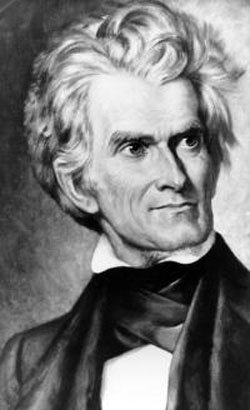
John Caldwell Calhoun; Y’ 1804; Vice President of the United States, 1825-1832; Secretary of State, 1844-1845; Secretary of War, 1817-1825; Senator from South Carolina, 1832-1843 and 1845-1850; Member House of Representatives representing 6th District of South Carolina, 1811-1817; Author, Disquisition on Government (1849), Discourse on the Constitution and Government of the United States (1851); defender of States’ Rights and proponent of the “Concurrent Majority” doctrine holding that minorities ought to have the right in extremis to block majority rule; and member of the all-time Great Triumvirate of the U.S. Senate.
1) Calhoun College stays Calhoun College.
Yale President Salovey announced yesterday afternoon, the Oldest College Daily reported, that the residential college named for Yale’s greatest political thinker and statesman would retain its name, despite John C. Calhoun having held, in the first half of the 19th century, positions on Slavery and inherent Racial Inferiority generally regarded with abhorrence today.
Salovey justified this decision on the part of the Administration and the Corporation, saying:
Removing Calhoun’s name obscures the legacy of slavery rather than addressing it. Erasing Calhoun’s name from a much-beloved residential college risks masking this past, downplaying the lasting effects of slavery and substituting a false and misleading narrative, albeit one that might allow us to feel complacent or, even, self-congratulatory.â€
I suspect that, unreported, unacknowledged, and unsung, somewhere in the decision-making meeting rooms in Woodbridge Hall a dramatic last stand was taken by someone on behalf on history, tradition, and sanity, and that there must have been some terrible threat of a grand financial legacy being withheld were Calhoun’s name to be removed.
——————————–
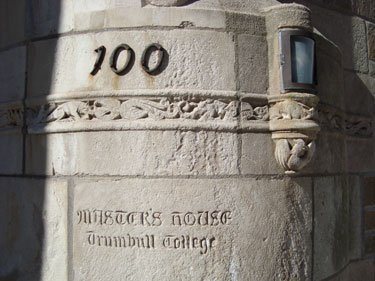
Master’s House, Trumbull College
2) The Title of “Master” of a Residential College Will Be Changed to “Head.”
Salovey wrote:
The use of “master†as a title at Yale is a legacy of the college systems at Oxford and Cambridge. The term derives from the Latin magister, meaning “chief, head, director, teacher,†and it appears in the titles of university degrees (master of arts, master of science, and others) and in many aspects of the larger culture (master craftsman, master builder). Some members of our community argued that discarding the term “master†would interject into an ancient collegiate tradition a racial narrative that has never been associated with its use in the academy. Others maintained that regardless of its history of use in the academy, the title—especially when applied to an authority figure—carries a painful and unwelcome connotation that can be difficult or impossible for some students and residential college staff to ignore.
Among the many comments considered on this matter, the thoughts and recommendations of the current Council of Masters, the twelve heads of the existing residential colleges, were especially salient. The council deliberated at length, informed by a multitude of discussions with students, staff, faculty, and fellows, as well as by reflections submitted to an online site open to all members of each residential college community. The council also monitored similar discussions at other colleges and universities, although its members were determined to arrive at their recommendations bearing in mind Yale’s distinctive traditions and culture.
The council found that making a recommendation to change the title was far from simple. People held a wide range of views, not as strongly correlated as some might have predicted with circumstances of age, race, or position in the college community. Nothing about the term itself is intrinsically tied to Yale’s history prior to 1930, or to the relationships that students of each generation have formed or will form with the individuals who lead their colleges. Moreover, a decision to stop using the term “master†does not compromise the study of larger historical issues. In short, the reasons to change the title of “master†proved more compelling than the reasons to keep it, and the current masters themselves no longer felt it appropriate to be addressed in that manner.
Not incidental to the discussion was the task of finding an alternative title that speaks to the definition and responsibilities of the office. In this respect, “head of college†is the most logical and straightforward choice. In its favor is that archival records show that “head†and “headship†were placeholders for the title in the original planning documents. Heads of college may be addressed as professor, doctor, or Mr. or Ms., as applicable or as they prefer.
Alumni, particularly those of Calhoun College, actually cared about their college’s name being changed. Nobody particularly cared about the Master title, so Master was obviously the perfect sacrifice to fling upon the PC bonfire to appease the mob.
Yalies tend to be pedantic and good at research, so one does wonder why Peter Salovey and his powers-that-be confreres did not trouble themselves to consider “Warden,” “Rector,” or even “President” (as at Magdalen College, Oxford), but instead followed sheepishly along in the lame footsteps of Harvard and Princeton in changing that title to “Head.” It rankles, I think, that the pathetic creature occupying the chair in which John Hersey once sat, set the contemptible policy which the entire set of residential college will be proceeding to follow.
——————————–
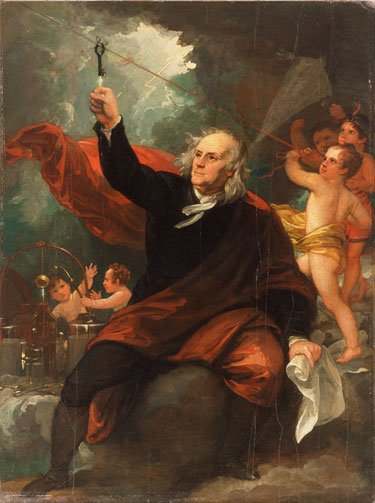
Benjamin West, Benjamin Franklin Drawing Electricity from the Sky, 1816, Philadelphia Museum of Art
3. The new residential colleges will be named for Benjamin Franklin and Pauli Murray (whoever the hell she is).
Peter Salovey explained:
Benjamin Franklin College will recognize the recipient of a Yale honorary degree (1753 Hon. M.A.) whose immense accomplishments span the arts, the sciences, government, and service to society. The 41 published volumes of his papers, which contain the record of Benjamin Franklin’s life correspondence, are among the Yale University Library’s most important collections. The Franklin Papers represent the work of many Yale scholars and editors and, among the historical insights they offer, shed light on Franklin’s relationship with Yale University. He carried on a decades-long correspondence with Yale President Ezra Stiles on subjects ranging from scientific research to the growing collections of Yale’s library.
John Adams, I guess, would have disagreed with this choice. He said of Dr. Franklin, in a 1783 letter to James Warren: “His whole life has been one continued insult to good manners and to decency.â€
But most of us today are nowhere nearly as censorious of Franklin’s illegitimate son and illegitimate grandson or of Franklin’s (1747) The Speech of Polly Baker, defending a fictional woman for bearing illegitimate children.
Franklin’s accomplishments in literature and scientific experiments and as a founder of the United States are so great that nobody could deny his worthiness as the namesake of a college.
The only problem is that he really had no genuine substantive connection to Yale.
Apparently, what really went on here was was explained in a letter from Salovey:
[A]dopting his name for one of the new colleges, we honor as well the generosity of Charles B. Johnson ’54 B.A., who considers Franklin a personal role model. Mr. Johnson’s contribution to enable the construction of the new colleges is the single largest gift made to Yale. Pauli Murray College and Benjamin Franklin College, which will open Yale’s doors to thousands of additional future students, would not have been possible without his philanthropic vision.
Money talks. It isn’t really appropriate, but the man paid for the piper, so he gets to call the tune. It could be worse. We could have a residential college named “Pforzheimer.”
——————————–

Anna Pauline “Pauli” Murray, Y ’65 J.S.D., ’79 Hon. D.Div., four-fer, maybe five-fer
And, then, of course, we come to the pièce de résistance, the inevitable jolie cadeau de la révolution française, the big, fat chunk of tokenism:
The northern-most college, sited closest to Science Hill, Pauli Murray College will honor a Yale alumna (’65 J.S.D., ’79 Hon. D.Div.) noted for her achievements in law and religion, and for her leadership in civil rights and the advancement of women. Pauli Murray enrolled at Hunter College in the 1920s, graduating in 1933 after deferring her studies following the Great Depression. Later, she began an unsuccessful campaign to enter the all-white University of North Carolina. Murray’s case received national publicity, and she became widely recognized as a civil rights activist.
A graduate of Howard Law School, Murray had an extraordinary legal career as a champion of racial and gender equity. United States Supreme Court Justice Thurgood Marshall cited her book, States’ Laws on Race and Color, for its influence on the lawyers fighting segregation laws. President John F. Kennedy appointed her to the Committee on Civil and Political Rights of the President’s Commission on the Status of Women.
Awarded a fellowship by the Ford Foundation, Murray pursued a doctorate in law at Yale in order to further her scholarly work on gender and racial justice. She co-authored Jane Crow and the Law: Sex Discrimination and Title VII, in which she drew parallels between gender-based discrimination and Jim Crow laws. In 1965, she received her J.S.D. from Yale Law School, the first African-American to do so. Her dissertation was entitled, Roots of the Racial Crisis: Prologue to Policy. Immediately thereafter, she served as counsel in White v. Crook, which successfully challenged discrimination on the basis of sex and race in jury selection. She was a cofounder, with thirty-one others, of the National Organization for Women.
Murray was a vice president of Benedict College in Columbia, South Carolina; she left to become a professor at Brandeis University, where she earned tenure and taught until 1973. She was the first person to teach African-American studies and women’s studies at Brandeis.
The final stage of Murray’s career continued a life marked by confronting challenges and breaking down barriers. At age 63, inspired by her connections with other women in the Episcopal Church, she left Brandeis and enrolled at the General Theological Seminary. She became the first African-American woman ordained as an Episcopal priest..
And you’ve got to hand it to Salovey, the Yale Administration, and the Corporation. When they set out to truckle and to pander to contemporary whiny left-wing identity groups, they do it good and proper. Obviously, in reality, there are no females, there are no African-Americans associated with Yale so eminent or of such accomplishment as to be even close to being genuinely worthy of being the namesake of a Yale College. Hilariously, as well, nobody outside the organized left has ever actually heard of Pauli Murray but, upon looking her up, one finds that, if you are going to pander, she is the cat’s pajamas. Pauli Murray was merely a minor left-wing public nuisance and lived and died in obscurity, but she combines in one small dusky package absolutely everything: she was female, African-American, queer, an Episcopalian priestess, and a transgender wannabee. What a deal! Let’s hope Yale, in future, treats Murray College as its own equivalent of California, and sends all of its commies, fruits, and nuts to go live there at the remote extremity of the campus.
27 Apr 2016

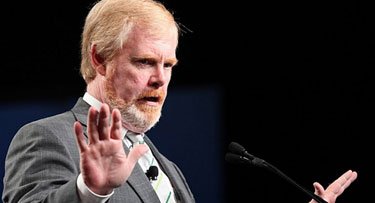
Brent Bozell implores his fellow Movement Conservatives to think seriously about what they are doing, and to dissociate themselves from Donald Trump’s candidacy before it is too late.
Even those of us who oppose Trump understand that he’s tapping into something that has exploded onto the national scene: disenchantment, even white-hot rage among the Republican base with the party’s establishment and the Washington status quo. You and I understand this because we were taking on the weak-kneed GOP leadership many, many years ago, back when Donald Trump was donating to Bill and Hillary Clinton.
Is Donald Trump the answer? That question’s on everyone’s mind. But there needs to be another question answered first: Does Donald Trump mean a word he says? Are conservative leaders supporting Trump prepared to live with the consequences if he doesn’t?
Many critics have outlined the innumerable left-wing positions and candidates Trump championed before he got in this race. It’s worth recalling some of them now: Trump not only supported but bankrolled amnesty. He supported taxpayer funding of Planned Parenthood. He supported not just abortion but partial-birth abortion. He was open to gay marriage. He supported government-funded universal healthcare.
He supported eminent domain for (his) private gain. He supported the Wall Street bailout. He supported “assault weapons†bans. He applauded President Obama for doing a “great job.†He congratulated Secretary of State Hillary Clinton for doing a “good job.†He financially helped the Democrats pass Obamacare. Trump was a registered Democrat when that party was being led by the likes of Rep. Nancy Pelosi (D-CA) and Sen. Harry Reid (D-NV), donating heavily during President Obama’s tenure. He’s bankrolled Democrats like Jimmy Carter, Rahm Emmanuel, Anthony Weiner, Terry McAuliffe, Chuck Schumer, Charlie Rangel, Ted Kennedy and John Kerry, to name a few.
But Trump said he’s changed. On everything. Overnight. Just in time for the GOP nomination fight.
Really?
Let’s look at Mr. Trump’s record during this campaign. He’s declared his support for single-payer healthcare. That puts him to the left of Obamacare. He’s re-declared his support for Planned Parenthood. He’s re-supporting tax increases. He’s supported crony capitalism. He’s endorsed “touchback†amnesty. He wants the U.S. to break the Geneva Convention. He’s “neutral†on Israel and Palestine. He wants South Korea and Japan to have nuclear arsenals.
Paul Krugman loves Trump’s big government economic plan for the simple reason that big government will remain under President Trump.
Two weeks ago, Mr. Trump took the left’s side in the North Carolina transgender bathroom controversy.
Last week Mr. Trump announced—guess what?—he’s not just pro-abortion, he wants the pro-life plank in the GOP platform removed, thus divorcing the Republican Party from the pro-life movement. Sarah, Ben, Mike, Phyllis: How can you still support this man? He has now thrown you under the bus, embracing an agenda you’ve spent your entire career opposing. Can you accept that betrayal?
What will you tell your supporters when the man you endorsed enacts an agenda that horrifies them?
As the Republican primaries draw to some sort of conclusion, right now Trump is surrounding himself with GOP establishment types, trying to assure them he doesn’t really mean many of the things he’s said, claiming that much of his campaign is just posturing.
Posturing to whom?
Top Trump aide Paul Manafort is telling GOP establishment bosses behind closed doors that his boss is “a real different guy.†His campaign openly touts his chameleon-like character as some sort of general election advantage.
Is someone with no discernible principles the candidate you want leading the Republican Party and taking on the Democrats in 2016?
Is someone who consistently lies about principles and positions he doesn’t hold worthy of your support?
If Trump becomes the nominee, and enacts the policies he’s now championing, will conservatives who chose to aid and abet Mr. Trump be able to live with their decision?
When it comes time to nominate a new Supreme Court Justice, and President Trump names his radically pro-abortion sister, as he’s suggested he would, or some other radically pro-abortion pro- Planned Parenthood jurist, as we know he will, will you accept that you helped him do that?
27 Apr 2016

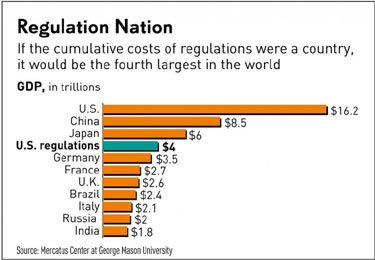
Investors Business Daily cites a George Mason University Study of the compliance cost of federal regulations which finds that those costs are truly staggering.
Economists scratch their heads when asked to explain the economy’s tepid growth over the past several years. A new study gives a possible answer: the growing, cumulative burden of federal regulations.
Under President Obama, annual GDP growth never once even hit 3%. Under Bush before him, there were only two years when growth topped 3%. But in the two decades before that, annual GDP growth was above 3% in all but six years.
Growth has been so anemic for so long, we’re now being told that this is the “new normal.†As the Bureau of Labor Statistics put it, “annual U.S. GDP growth exceeding 3% … is not expected to be attainable over the coming decade.†It lists everything as a cause, except for one thing: federal regulations.
Whenever a new regulation gets passed, the government puts out a cost analysis, which focuses on annual compliance costs. That’s fine for a point in time. But these regulations don’t go away. And every year more get added to the pile. The Code of Federal Regulations is now more than 81,000 pages long.
What’s the cumulative impact of all these rules, EDIT3-regu-042616regulations and mandates over several decades? A new study by the Mercatus Center at George Mason University tries to get an answer, and what it found is mind-boggling.
The paper looked at regulations imposed since 1977 on 22 different industries, their actual growth, and what might have happened if all those regulations had not been imposed.
What it found is that if the regulatory state had remained frozen in place in 1980, the economy would have been $4 trillion — or 25% — bigger than it was in 2012. That’s equal to almost $13,000 per person in that one year alone.
Looked at another way, if the economic growth lost to regulation in the U.S. were its own country, it would be the fourth largest economy in the world, as the nearby chart shows.
Read the whole thing.
26 Apr 2016

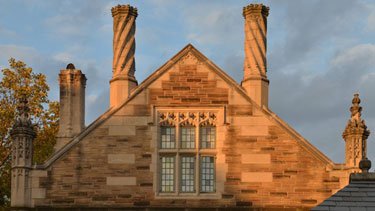
Roofline of Berkeley College Master’s House at Yale. Don’t you love those Tudor chimneys?
The Oldest College Daily happily reports that Yale is currently well along in the process of following the examples set by Harvard and Princeton in eliminating the title of Master for the heads of undergraduate residential colleges or houses.
Apparently, a majority of current students have gradually fallen into line in support of the demands of the radical lunatic fringe that the title be changed. In their wake, hastening to come on board, can be found the actual adults making up both the Yale Administration and the Yale Corporation.
A small racially-obsessed group of leftists, quite recently, decided that 150 years after the elimination of Slavery in the United States, it must be actively painful and humiliating for students-of-color to have occasion to address a head of college as “Master.” The memories and associations, you see, are just too painful. (sob!)
At Yale, the nonsense started last year, when the current Master of Pierson College, a hyper-sensitive creep named Stephen Davis found his new title unacceptable, and sent a letter to the college urging students to eschew tradition and address him merely as “Dr.” or “Professor” Davis.
One has to bear in mind that the title of Master has nothing whatsoever to do with Antebellum Slavery. It has everything to do with Anglophilic tradition and Pretension.
19th century Yale students were members of a single college (Yale College) or (if banausic) of the Sheffield Scientific School. The poor lived off-campus in rented hovels, the better-off in rooms in college residential buildings called “halls,” then much resembling architecturally orphanages or reformatories.
Where the Master business came from was via the philanthropy of Edward Harkness, a member of the Class of 1897. Harkness was the scion of a Standard Oil fortune. He had money like God has money, and cheerfully volunteered to pay for the transformation of both Harvard and Yale into residential colleges, i.e., fantasy imitations of the colleges at Oxford and Cambridge Universities, designed at Yale by his classmate James Gamble Rogers. Yale’s student body was divided among ten (later twelve) residential college and its grim Victorian architecture was augmented by a new campus of whimsical Tudor and Georgian design.
The heads of Yale residential colleges and Harvard houses were called “Masters” in pure imitation of the practice of the majority of Oxbridge Colleges. Master, in this case, is a purely academical title, an anglicized version of the Latin “Magister.” It has no connection to Slavery. Nor does it imply domination of anything. A College Master at Yale has traditionally been a distinguished senior faculty member who lives in a mansion associated with a residential college and who functions essentially as that college’s master of ceremonies. The College Master is formally administrative head of the college, but he has a Dean and a bunch of secretaries and student aids to do all the shit work. The Master smiles at students, presides over functions, throws parties, and thinks up new, nice things he can do for the benefit of the undergraduates in his college.
There would be no opportunity for this particular politically correct grand gesture today, of course, had the presidents of Yale and Harvard in the early 1930s possessed crystal balls. They would then have foreseen all this, and taken care to call heads of residential colleges (or houses) “Rector” instead (as is the practice at Exeter College, Oxford and King’s College, Cambridge) or “Warden” (All Souls College, Oxford and Robinson College, Cambridge). Upon reflection, though, having to address the head of one’s housing unit as “Warden” could very possibly also have become a major issue for contemporary Ivy League students-of-color.
/div>

Feeds
|

















